Review: "Dune: Part Two" is more History than Story
 Thursday, February 29, 2024 at 8:00PM
Thursday, February 29, 2024 at 8:00PM 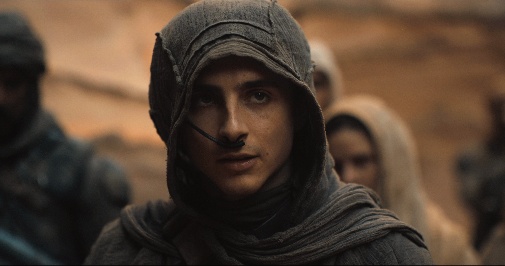
Denis Villeneuve's second Dune movie isn't a sequel, not quite. As the full title implies, it's part two of one madman's attempt at transcribing Frank Herbert's seminal space opera on the big screen. And so, it starts almost at the exact point the 2021 film ended, with Timothée Chalamet's Paul Atreides seeking refuge among the Fremen after his Great House was dilacerated in a violent coup. The body of Jamis, the man Paul killed in ritual duel, is still fresh and carried by Stilgar's tribesmen as they guide the princeling and his mother, Lady Jessica, to the underground warren of Sietch Tabr. A prophecy is at stake, and enemy troops aren't nearly as deadly as the dangers waiting for them in the planet-sized desert.
Dread is everywhere, overwhelming, sticking in the throat until it feels like you're already being suffocated by the film before its epic imagery can get a chance to crush you. Villeneuve has done it again…
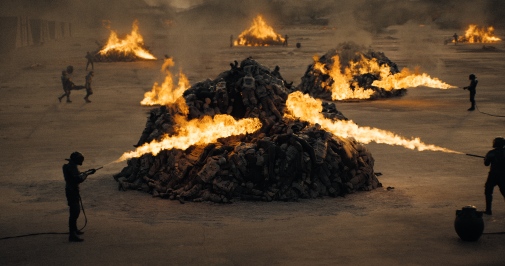
Prior to finding Paul in his desert odyssey, a black screen serves as the viewer's entry point into Dune: Part Two. Over the void, a guttural cry articulates what seem like words, undecipherable if not for the subtitles stating: "Power over Spice is power over all." That resource can only be found and harvested in Arrakis, a planet plagued and blessed by giant sandworms. A plague because they are leviathans swimming through a dry ocean, sowing death whenever they surface. Their preservation is also why the potential greenery of this world had to be suppressed until the planet remained as one massive expanse of sand with little to no water in sight.
And the paramount need to keep them thriving comes from their blessing – the spice known as melange. It prolongs life and provides visions of past, sometimes future too. More importantly, it's the basis of space travel in a world where computerized technology disappeared ages ago. It's a lot, and so are the books that birthed these concepts. Published between 1963 and 1985, the six main Dune novels are a critique of fascism written for an age of crumbling empires. Anti-colonial sentiment meshes with fear for the ecological apocalypse that's coming for the human race, all wrapped up in a space opera left delirious by a spice overdose. It's political, and it's nasty, including a vicious reckoning with the evil of any and all religions.
This last facet is evident all over Part Two, starting when Paul and Lady Jessica finally reach Stiech Tabr. There, they find a populus split by belief and skepticism, with Stilgar as their defender and the face of the zealot faction. To the tribe leader Javier Bardem plays with equal parts levity and despair, the Atreides heir is the prophesized outsider that will guide the Fremen to Paradise – the Lisan al Gaib or Kwisatz Haderach. Zendaya's Chani, who haunted Paul's dreams in Part One, is less easy to convince, though there's a clear attraction between her and the young man, the seedling of attention bound to blossom in barren land.
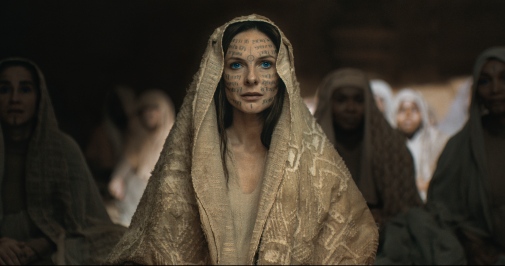
Lady Jessica, for her part, must fulfill the role of the hero's progenitor, becoming a Reverend Mother by drinking the Water of Life. It's poison, but what choice does she have? It's either this or death. As part of the Bene Gesserit sisterhood, she's capable of transmutation, abating the toxicant's deadly power within her. It keeps Jessica from succumbing but also lets her inherit all memories of her female ancestors, centuries of pain and sorrow. Change is unavoidable, and the film's tone seizes in transformation with her. In some ways, Lady Jessica was the beating heart of Part One, embodied by MVP Rebecca Ferguson as an internal storm of duty and defiance, always terrified of the machinations most others ignore.
Her choice of giving Duke Leto a son was the fracture point in the centuries-old plan by which the Bene Gesserit constructed the Kwisatz Haderach belief and engineered a messiah they'd have complete control over. It's all Machiavellian stratagem by power brokers using religion as their ultimate weapon. Now, Lady Jessica becomes the picture's creepiest fixture, her ascension to Reverend Mother like a severing of personhood. She becomes alienated and alienating. Instead of contradicting her sisterhood's grand plan, she takes full advantage of the witches' doings, spurring the faithful Fremen and pushing Paul down the path to absolute power.
Through Ferguson's work, a vein of horror flows within Dune's organism, intensified by her silent conversations with the fetus gestating inside, a daughter not yet born but already burdened with the knowledge of generations. Unlike David Lynch, Villeneuve isn't brave enough to have that child see the light of day yet. Alia is a voice and a vision in prophetic dreams, never a blue-eyed babe speaking with impossible wisdom. Because of that and other divergences from the novel's Byzantine grotesquerie, it doesn't surprise me that Villeneuve intends to stop at Dune: Messiah, the second installment.
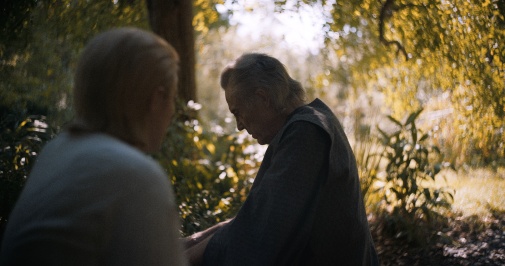
After all, the sight of Paul's future son in full glory seems antithetical to his brutalist cinema. If he couldn't give us Alia or the spiced-out navigators, a human body merged with the Shai-Hulud would be unthinkable. And what of the horde of Duncan Idaho clones or a universe regressed to the Middle Ages? One can practically picture the director gasping "abomination" to himself. That may mean his dramaturgic and aesthetic approach is a trap. While it works for now, the films' continuation into Children of Dune, The God Emperor, Heretics and so forth seems impossible. At some point, there must be a metamorphosis of cinematic idiom, for this vision of Dune cannot sustain itself or Herbert's crazed text.
Still, it works marvelously in Part Two, suggesting a space opera opulence the likes of which we've hardly seen on the big screen. Villeneuve has a sense of scale like few directors nowadays, all the more apparent in a second chapter that need not be ruled by info dumps every few minutes. With world-building behind them, the Part Two filmmakers are ready to exist in the world without the need to explain it constantly. It can be confusing and distancing, but that's part of the charm. The development lets the text flow through action more smoothly, but it also opens the floodgates for visual invention, much greater than what we saw in the first Dune.
In Part One, the different planets were united by ensconcing shadows, varied but submitted to a sometimes-smothering aesthetic unity. Sure, we glimpsed the Harkonnen obsidian throne and the Atreides' home planet of emerald hills and turquoise sea, but their visual quality wasn't a shocking contrast. In this new film, after the desert-set first act gives way to a broader scope, every location and culture is a zap out of stylistic stagnation. In Giedi Prime, where we meet Austin Butler's psychopathic Feyd-Rautha and Léa Seydoux's Lady Margot, daylight turns the image black-and-white. It's no standard grayscale, mind you.
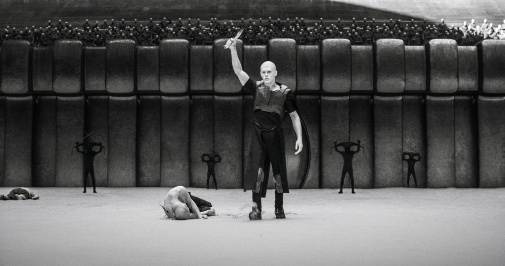
DP Greig Fraser has devised a look where white skin becomes alabaster lit from within, and gaping mouths are like oil pits crying a bloodthirsty howl. Later in the same sequence, Seydoux embodies a femme fatale floating through editing jumps and playful lighting, a dominatrix nun draped in velvet, ready to hypnotize her target and the audience watching in the movie theater. We find another stylistic antithesis as we cut from there to the Imperial Court. Despite his penchant for epic imagery, Villeneuve's conception of the Padishah Emperor Shaddam IV of the Known Universe and his dominion are conspicuously modest.
In a world full of gigantic structures, lifeless expanses, and seas of clamoring people, the ruling class inhabits a bubble of greenery and peace. Maybe the quiet is a privilege almost rarer than spice. It's enough to bolster the striking (mis)casting of Christopher Walken and Florence Pugh as the despot and his daughter, Princess Irulan. Even something as simple as the pops of melange blue on Arrakis have been taken to new heights by CGI, production and costume design. Going beyond what the eye can perceive, the musicality of Part Two is equally astounding. Hans Zimmer's new main theme is something of a leitmotiv for the love between Paul and Chani.
I'd go so far as saying that it conveys the emotional weight of Dune more than anything in the screenplay does, making amorphous chanting into a song of hope rather than the first film's lamentation. It's also the wail of the Fremen faith, a sacred sound that elevates the score to celestial heights and brings the rest of the movie along for the ride. Which is why, when the roar of battle takes over the sountrack, the contrast is so visceral and upsetting – quite the rarity in this emotionally detached picture. You see, much of Paul's tragedy centers on the eradication of self, one’s own Humanity left behind.
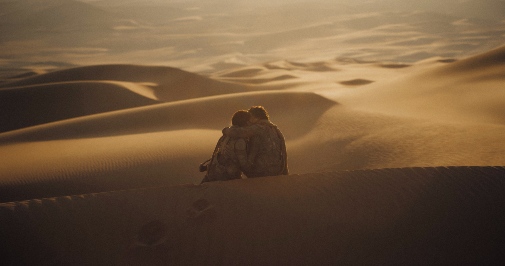
Led to drinking the Water of Life like his mother, he's unmoored and made a tyrant at the head of a holy war. He's left left cognizant of all that's been and prescient of all that can be. However, the film presents this drama so that we never truly feel the loss of Paul, the person. In this and other ways, Dune: Part Two fails as a story of characters. But that's because a story it is not. Instead, it's a history, its characters naught but specks of dust carried by the winds of time. We don't get to feel the intimate cost of choice because they seldom manifest in such terms. One feels that everything has already happened, every path set in stone by a fatalistic chisel. Instead of narrative, Dune has been rendered a great mural carved into mausoleum walls. It's as if Villeneuve allies his perspective to the Bene Gesserit and their perusal of the bigger picture above all else.
For those hoping to engage with the characters' humanity, Dune: Part Two may prove to be a frustrating watch. But if you engage with what it's offering, it can be rewarding. I confess it was something I struggled with in Part One but came to love about its continuation, all puzzle pieces slotted into place. Even the relative anticlimax comes off as a fitting gesture. There's no triumph at the end of Dune: Part Two, for this is a hollow glory and should be treated accordingly. It's a pyrrhic victory whether the figures on screen know it or not. Well, Paul knows it. Chani fears and hates it, trembling in fury at everything to do with it. And Lady Jessica is reaching toward awareness, inching ever closer to knowledge and away from Humanity. Everyone else stays ignorant, blessedly drunk on what looks like narrative closure but isn't. Dune: Messiah awaits!
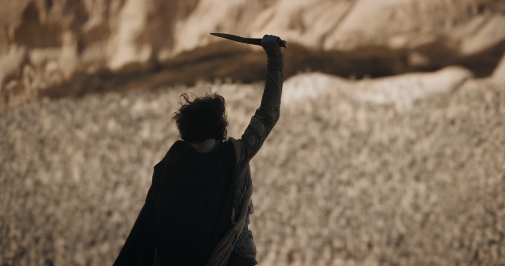



Reader Comments (7)
I had plans to see it this Saturday but I'm too ill to go and Fandango wouldn't refund me.
AMC just gave me my refund. Remember, don't use your AMC or any other non-Fandango cards to use at Fandango.
thevoid99 -- Hope you enjoy the film when you're feeling better and get a chance to see it.
Cláudio, this is a very astute review and helps me put my finger on why the film left me a bit cold. The craft, don't get me wrong, is amazing, and the acting is strong. But the whole narrative felt so predetermined, ritualistic, ceremonial, it buried the few sparks of emotional connection - all by design, as you suggest. We're watching a myth being consciously constructed, not coming to organic life.
Interestingly, I didn't feel that way about Part 1. For me, Part 1 was more human scaled, both in scope and tone, in large part because Paul and Jessica hadn't yet fully stepped into their superhuman roles. The bond between Paul and his father and Paul and Duncan Idaho felt more intimate and palpable and by that token, the creeping dread and eventual anguish more penetrating, than anything about the doomed romance between Paul and Chani in Part 2.
This is one of the few reviews I've read that I agree with. I was left a bit hollow with this film and you explained why. The stakes, rendered historical, never get down to the personal level. Paul's fear, while acknowledged, didn't feel deep and lived-in, and Paul's loss of self didn't feel as weighty as it ought to have. I think there's a lot with Chani that works, but it's more about the perspective she offers in this grand story rather than her and Paul's development. I found myself watching in a rather detached way, something that wasn't true during the first film. I also wonder if a big part of that is how quickly we lose Ferguson's Lady Jessica, with seemingly little conflict, where her emotional story with Paul so beautifully anchored the first film.
I think you're right that this is a film rendered on a grand scale and it's beautiful to look at. However, I don't think it's lyrical. The first one was and so is Arrival. I suppose there's a reason to make this part of the story detached, but I don't think it works in epic filmmaking. Even if we are seeing history fall into place, it feels a bit futile if the emotional resonance isn't there. I actually though the power of the score pointed out some of this hollowness to me, as it felt so disconnected.
That being said, there are moments of fun. The Lady Margot stuff all works really well, and it's quite fun seeing the Reverend Mother's arch and ultimate fall to Lady Jessica.
I'm curious, why do you see Walken (and Pugh??) as miscast?
Joe G. -- Thank you for your kind words. I'm especially happy that you found the review articulated your experience somewhat, even if, ultimately, I enjoyed the coldness more than you.
Those two characters would have worked better if they were as alienating as their setting and text suggests. Walken speaks with such a distinctive cadence I can't help but be jolted out of the film. I did enjoy just how tired and powerless his Emperor is, contradicting some presuppositions the audience might have about his character.
As for Pugh, she almost seemed too expressive and open for the character as devised within Villeneuve's adaptation. It's an odd thing to criticize an actor for, but that's what I felt. Something like Marisa Berenson in BARRY LYNDON seems like a more ideal approach to Irulan.
This is the rrare case where I actually want to see it again in theaters even though I didn't absolutely love it. but it's such epic scale filmmaking. The whole Feyd Rautha intro chapter is just A+ mesmerizing.